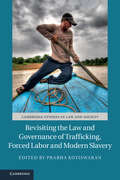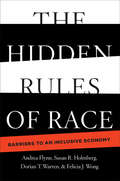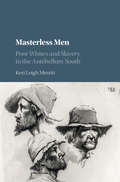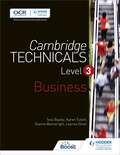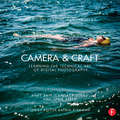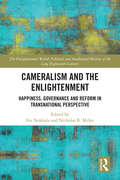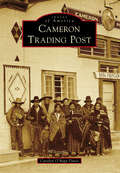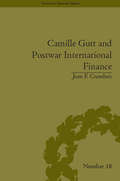- Table View
- List View
Cambridge Studies in English Legal History: Insurance in Elizabethan England
by Guido RossiEnglish insurance came into being almost entirely during the Elizabethan period. However, the Great Fire of 1666 consumed most of London's mercantile document, and therefore little is known about early English insurance. Using new archival material, this study provides the first in-depth analysis of early English insurance. It focuses on a crucial yet little-known text, the London Insurance Code of the early 1580s, and shows how London insurance customs were first imported from Italy, then influenced by the Dutch, and finally shaped in a systematic fashion in that Insurance Code. The London Insurance Code was in turn heavily influenced by coeval continental codes. This deep influence attests the strong links between English and European insurance, and questions the common/civil law divide on the history of commercial law.
Cambridge Studies in International and Comparative Law: The Doctrine of Odious Debt in International Law
by Jeff KingAccording to the doctrine of odious debt, loans which are knowingly provided to subjugate or defraud the population of a debtor state are not legally binding against that state under international law. Breaking with widespread scepticism, this groundbreaking book reaffirms the original doctrine through a meticulous and definitive examination of state practice and legal history. It restates the doctrine by introducing a new classification of odious debts and defines 'odiousness' by reference to the current, much more determinate and litigated framework of existing public international law. Acknowledging that much of sovereign debt is now governed by the private law of New York and England, Jeff King explores how 'odious debts' in international law should also be regarded as contrary to public policy in private law. This book is essential reading for practising lawyers, scholars, and development and human rights workers.
Cambridge Studies in International and Comparative Law: The Formation and Identification of Rules of Customary International Law in International Investment Law
by Patrick DumberryRules of customary international law provide basic legal protections to foreign investors doing business abroad. These rules remain of fundamental importance today despite the growing number of investment treaties containing substantive investment protection. In this book, Patrick Dumberry provides a comprehensive analysis of the phenomenon of custom in the field of international investment law. He analyses two fundamental questions: how customary rules are created in this field and how they can be identified. The book examines the types of manifestation of State practice which should be considered as relevant evidence for the formation of customary rules, and to what extent they are different from those existing under general international law. The book also analyses the concept of States' opinio juris in investment arbitration. Offering guidance to actors called upon to apply customary rules in concrete cases, this book will be of significant importance to those involved in investment arbitration.
Cambridge Studies in Law And Society: Criminal Defense in China
by Halliday Sida Liu Terence C.Criminal Defense in China studies empirically the everyday work and political mobilization of defense lawyers in China. It builds upon 329 interviews across China, and other social science methods, to investigate and analyze the interweaving of politics and practice in five segments of the practicing criminal defense bar in China from 2005 to 2015. This book is the first to examine everyday criminal defense work in China as a political project. The authors engage extensive scholarship on lawyers and political liberalism across the world, from seventeenth-century Europe to late twentieth-century Korea and Taiwan, drawing on theoretical propositions from this body of theory to examine the strategies and constraints of lawyer mobilization in China. The book brings a fresh perspective through its focus on everyday work and ordinary lawyering in an authoritarian context and raises searching questions about law and lawyers, politics and society, in China's uncertain future.
Cambridge Studies in Law and Society: Contractual Knowledge
by Grégoire Mallard Jérôme SgardContractual Knowledge: One Hundred Years of Legal Experimentation in Global Markets, edited by Grégoire Mallard and Jérôme Sgard, extends the scholarship of law and globalization in two important directions. First, it provides a unique genealogy of global economic governance by explaining the transition from English law to one where global exchanges are primarily governed by international, multilateral, and finally, transnational legal orders. Second, rather than focusing on macro-political organizations, like the League of Nations or the International Monetary Fund, the book examines elements of contracts, including how and by whom they were designed and exactly who (experts, courts, arbitrators, and international organizations) interpreted, upheld, and established the legal validity of these contracts. By exploring such micro-level aspects of market exchanges, this collection unveils the contractual knowledge that led to the globalization of markets over the last century.
Cambridge Studies in Law and Society: Diversity in Practice
by Headworth, Spencer and Nelson, Robert L. and Dinovitzer, Ronit and Wilkins, David B. Spencer Headworth Robert L. Nelson Ronit Dinovitzer David B. WilkinsExpressions of support for diversity are nearly ubiquitous among contemporary law firms and corporations. Organizations back these rhetorical commitments with dedicated diversity staff and various diversity and inclusion initiatives. Yet, the goal of proportionate representation for people of color and women remains unrealized. Members of historically underrepresented groups remain seriously disadvantaged in professional training and work environments that white, upper-class men continue to dominate. While many professional labor markets manifest patterns of demographic inequality, these patterns are particularly pronounced in the law and elite segments of many professions. Diversity in Practice analyzes the disconnect between expressed commitments to diversity and practical achievements, revealing the often obscure systemic causes that drive persistent professional inequalities. These original contributions build on existing literature and forge new paths in explaining enduring patterns of stratification in professional careers. These more realistic assessments provide opportunities to move beyond mere rhetoric to something approaching diversity in practice.
Cambridge Studies in Law and Society: Revisiting the Law and Governance of Trafficking, Forced Labor and Modern Slavery (Cambridge Studies in Law and Society)
by Prabha KotiswaranIn the decades following the globalization of the world economy, trafficking, forced labor and modern slavery have emerged as significant global problems. States negotiated the Palermo Protocol in 2000 under which they agreed to criminalize trafficking, primarily understood as an issue of serious organized crime. Sixteen years later, leading academics, activists and policy makers from international organizations come together in this edited volume and adopt an inter-disciplinary, multi-stakeholder approach to revisit trafficking through the lens of labor migration and extreme exploitation and, in the process, rethink the law and governance of trafficking. This volume considers many key factors, including the evolving international law on trafficking, the relationship between trafficking, slavery, indenture and domestic migration law and policy as well as newly emergent techniques of governance, including indicators, all with a view to furthering prospects for lasting economic justice in a globalized world.
Cambridge Studies in Medieval Life and Thought: The Rise and Decline of an Iberian Bourgeoisie
by Jeff Fynn-PaulThe Rise and Decline of an Iberian Bourgeoisie is one of the first long-term studies in English of an Iberian town during the late medieval crisis. Focusing on the Catalonian city of Manresa, Jeff Fynn-Paul expertly integrates Iberian historiography with European narratives to place the city's social, political and economic development within the broader context of late medieval urban decline. Drawing from extensive archival research, including legal and administrative records, royal letters, and a cadastral survey of more than 640 households entitled the 1408 Liber Manifesti, the author surveys the economic strategies of both elites and non-elites to a level previously unknown for any medieval town outside of Tuscany and Ghent. In a major contribution to the series, The Rise and Decline of an Iberian Bourgeoisie reveals how a combination of the Black Death, royal policy, and a new public debt system challenged, and finally undermined urban resilience in Catalonia.
Cambridge Studies in Stratification Economics: Barriers to an Inclusive Economy (Cambridge Studies in Stratification Economics: Economics and Social Identity)
by Warren Wong Flynn Andrea Holmberg Susan R. Dorian T. Felicia J.Why do black families own less than white families? Why does school segregation persist decades after Brown v. Board of Education? Why is it harder for black adults to vote than for white adults? Will addressing economic inequality solve racial and gender inequality as well? This book answers all of these questions and more by revealing the hidden rules of race that create barriers to inclusion today. While many Americans are familiar with the histories of slavery and Jim Crow, we often don't understand how the rules of those eras undergird today's economy, reproducing the same racial inequities 150 years after the end of slavery and 50 years after the banning of Jim Crow segregation laws. This book shows how the fight for racial equity has been one of progress and retrenchment, a constant push and pull for inclusion over exclusion. By understanding how our economic and racial rules work together, we can write better rules to finally address inequality in America.
Cambridge Studies on the American South: Poor Whites and Slavery in the Antebellum South (Cambridge Studies on the American South)
by Merritt Keri LeighAnalyzing land policy, labor, and legal history, Keri Leigh Merritt reveals what happens to excess workers when a capitalist system is predicated on slave labor. With the rising global demand for cotton - and thus, slaves - in the 1840s and 1850s, the need for white laborers in the American South was drastically reduced, creating a large underclass who were unemployed or underemployed. These poor whites could not compete - for jobs or living wages - with profitable slave labor. Though impoverished whites were never subjected to the daily violence and degrading humiliations of racial slavery, they did suffer tangible socio-economic consequences as a result of living in a slave society. Merritt examines how these 'masterless' men and women threatened the existing Southern hierarchy and ultimately helped push Southern slaveholders toward secession and civil war.
Cambridge Technicals Level 3 Business
by Karen Tullett Tess Bayley Leanna Oliver Dianne WainwrightExam Board: CambridgeLevel: KS4Subject: BusinessFirst Teaching: September 2016First Exam: June 2017Support your teaching of the new Cambridge Technicals 2016 suite with Cambridge Technical Level 3 Business, developed in partnership between OCR and Hodder Education; this textbook covers each specialist pathway and ensures your ability to deliver a flexible course that is both vocationally focused and academically thorough.Cambridge Technical Level 3 Business is matched exactly to the new specification and follows specialist pathways in human resources, marketing, accounting and business planning.- Ensures effective teaching of each specialist pathway offered within the qualification.- Focuses learning on the skills, knowledge and understanding demanded from employers and universities.- Provides ideas and exercises for the application of practical skills and knowledge.- Developed in partnership between Hodder Education and OCR, guaranteeing quality resources which match the specification perfectlyHodder Education have worked with OCR to make updates to our Cambridge Technicals textbooks to bring them more closely in line with the model assignment course requirements. We would like to let you know about a recent change to this textbook, updated pages which are now available free of charge as a PDF when you click on the 'Amended Pages' link on the left of this webpage.
Cambridge Technicals Level 3 Business
by Karen Tullett Tess Bayley Leanna OliverSupport your teaching of the new Cambridge Technicals 2016 suite with Cambridge Technical Level 3 Business, developed in partnership between OCR and Hodder Education; this textbook covers each specialist pathway and ensures your ability to deliver a flexible course that is both vocationally focused and academically thorough.Cambridge Technical Level 3 Business is matched exactly to the new specification and follows specialist pathways in human resources, marketing, accounting and business planning.- Ensures effective teaching of each specialist pathway offered within the qualification.- Focuses learning on the skills, knowledge and understanding demanded from employers and universities.- Provides ideas and exercises for the application of practical skills and knowledge.- Developed in partnership between Hodder Education and OCR, guaranteeing quality resources which match the specification perfectly
Cambridge and the World Intellectual Property Organization: The Informal Economy in Developing Nations
by Erika Kraemer-Mbula Sacha Wunsch-VincentThe informal economy represents a significant share of output and employment in many developing countries. Yet little is known about this hidden engine of innovation. This pioneering study addresses some crucial questions, including: what is the role of the informal sector in economic development? How does innovation occur in the informal economy? How does it spread, who are the key actors and what impacts does it have? How do inventors and entrepreneurs in the informal economy reap benefits from their innovations? What stops informal sector innovation from scaling up? How can informal sector innovation in developing countries be measured? And what policies might support informal sector innovation and improve its impacts? This book will stimulate further work on this crucial but under-researched subject. As well as rich empirical evidence from several groundbreaking studies, it includes conceptual and methodological tools and policy recommendations to help researchers and policy-makers understand innovation in the informal economy. Opens a window to an important facet of innovation which has not been explored before Innovation within the informal sector is examined both conceptually and through several empirical studies Lays important groundwork for future empirical work, and for the development of appropriate metrics
Cambridge studies in international and comparative law: Civil Liability in Europe for Terrorism-Related Risk
by Niels Philipsen Bergkamp, Lucas and Faure, Michael and Hinteregger, Monika and Philipsen, Niels Lucas Bergkamp Michael Faure Monika HintereggerToday terrorism has become a world-wide phenomenon which does not stop at the European borders. Following the 9/11 attacks on the World Trade Centre and terrorist attacks in Paris, Madrid and London, concerns have arisen in Europe about potential liability exposure for terrorism-related damage. This book tackles the problem of civil liability for damage caused by terrorist acts from several angles. The authors expertly deliver a comprehensive analysis of terrorism-related risk under international and EU law and the national tort law systems of seven representative EU Member States. They also provide a comparison of the situation in Europe to the liability environment in the US. Risk mitigation strategies are considered and critically assessed, as are alternative systems for redressing terrorism-related risks. The book concludes with a reflection on the analysis and presents possible strategies for future regulation by the European lawmakers.
Cambridge studies in law and society: The World of Indicators
by Richard Rottenburg Rottenburg, Richard and Merry, Sally E. and Park, Sung-Joon and Mugler, Johanna Sally E. Merry Sung-Joon Park Johanna MuglerThe twenty-first century has seen a further dramatic increase in the use of quantitative knowledge for governing social life after its explosion in the 1980s. Indicators and rankings play an increasing role in the way governmental and non-governmental organizations distribute attention, make decisions, and allocate scarce resources. Quantitative knowledge promises to be more objective and straightforward as well as more transparent and open for public debate than qualitative knowledge, thus producing more democratic decision-making. However, we know little about the social processes through which this knowledge is constituted nor its effects. Understanding how such numeric knowledge is produced and used is increasingly important as proliferating technologies of quantification alter modes of knowing in subtle and often unrecognized ways. This book explores the implications of the global multiplication of indicators as a specific technology of numeric knowledge production used in governance.
Camelback Communications, Inc.
by Robin CooperCamelback Communications, Inc. has a poorly designed cost accounting system and is in the process of redesigning it. This case demonstrates how the old cost accounting system operated.
Camera & Craft: (The Digital Imaging Masters Series) (The Digital Imaging Masters Series)
by Andy Batt Candace Dobro Jodie Steen#2 on Photo.net's list of Best Photography Books of 2014! To create successful imagery, you need to balance technical know-how and aesthetic vision. In Camera & Craft, we deconstruct photographic principles in new ways to help you think through your process. Together with nine guest photographers, we explore photographic practice and follow up with inventive exercises and demonstrations that challenge you to engage with your tools—all with the goal of helping you work more creatively. Along the way are conversations with our guest photographers that address each topic, from how the professionals work with clients and models to what they think about as they look through the viewfinder. Here’s what you’ll find inside: Advice and insights from professionals working in a variety of fields, from photojournalism and portraiture to fine-art, landscape and commercial photography Technical explanations about how photographic tools work—so you can connect knowledge to your practice and work more instinctively and creatively Key steps for improving digital workflow Innovative exercises at the end of each chapter as well as on our companion website that encourage you to experiment with and understand the photographic process—from learning how far you can push your camera’s sensor to exploring the effects of neutral vs. creative color Interviews with technical and creative experts about developing skills and making images that matter This book is part of The Digital Imaging Masters Series, which features cutting-edge information from the most sought-after and qualified professionals and instructors in the photography field. Based on the progressive curriculum of the Master of Professional Studies in Digital Photography (MPS DP) program created by Katrin Eismann at the School of Visual Arts (SVA) in New York City, these books are the next best thing to being in the classroom with the Digital Photography Masters themselves.
Camera IQ and the Metaverse: Building Augmented Reality Brand Experiences
by Jill Avery Rayan NahasCamera IQ, a camera marketing software company that empowered brands to create and launch augmented reality experiences (AREs) across social platforms, had just raised an additional $5 million to fund further product development and expand its marketing and sales efforts. In the four years since the company's founding, Camera IQ had worked to "democratize the camera," breaking down the significant technological barriers that prevented companies from easily harnessing the power of AR at scale in their digital marketing campaigns. Now, the business stood at a critical juncture. It was time to accelerate the company's growth. Several issues were on the table for discussion, including how to segment and target their customer base to drive exponential growth. Second, the founders had to decide how to direct their engineering resources to refine their platform to meet the needs of an expanding and diversifying customer base. Some in the company were advocating for the development of a much cheaper product tier with capped features to capture the mass market, while others were arguing that the company should focus on refining a more intricate enterprise solution. Still others were excited about the possibility of launching a two-sided marketplace for AR content and templates. Third, as Camera IQ refined its customer value proposition,they would have to further differentiate AREs from other types of digital content and move beyond traditional notions of advertising toward the achievement of a richer, more immersive and engaging branded experience.
Cameralism and the Enlightenment: Happiness, Governance, and Reform in Transnational Perspective (The Enlightenment World)
by Ere Nokkala Nicholas B. Miller Anthony J. La VopaCameralism and the Enlightenment reassesses the relationship between two key phenomena of European history often disconnected from each other. It builds on recent insights from global history, transnational history and Enlightenment studies to reflect on the dynamic interactions of cameralism, an early modern set of practices and discourses of statecraft prominent in central Europe, with the broader political, intellectual and cultural developments of the Enlightenment world. Through contributions from prominent scholars across the field of Enlightenment studies, the volume analyzes eighteenth-century cameralist authors’ engagements with commerce, colonialism and natural law. Challenging the caricature of cameralism as a German, land-locked version of mercantilism, the volume reframes its importance for scholars of the Enlightenment broadly conceived. This volume goes beyond the typical focus on Britain and France in studies of political economy, widening perspectives about the dissemination of ideas of governance, happiness and reform to focus on multidirectional exchanges across continental Europe and beyond during the eighteenth century. Emphasizing the practice of theory, it proposes the study of the porosity of ideas in their exchange, transmission and mediation between spaces and discourses as a key dimension of cultural and intellectual history.
Cameron Trading Post (Images of America)
by Carolyn O'Bagy DavisIn 1911, a one-track suspension bridge was constructed over the gorge of the Little Colorado River, bypassing a treacherous river crossing and opening travel to northern Arizona. Five years later, Hubert Richardson built a tin-roofed shack on the river's rim and opened his trading post for business. In the first years, almost all of his customers were Navajo, but with the new bridge travelers soon found the area, and it became the access point for the Grand Canyon, Glen Canyon, and the Four Corners area. A century later, Cameron Trading Post is a thriving epicenter still serving Navajo people, tourists, and an impressive list of the famous and fascinating, including authors, scientists, and movie stars. Boasting a curio store, gas station, motel, RV park, grocery store, and art gallery, Cameron is visited by guests from all over the world. It is a crossroads and a destination for visitors to this historic trading post.
Cameron Trebbi at Taylor Lowell, LLP
by Karthik RamannaCameron Trebbi is a senior executive overseeing accounting policy at a large global auditing firm. His role is to lobby the firm's position with various accounting rule-making bodies worldwide. The firm is close to acquiring as new audit clients a consortium of Chinese state-owned enterprises. The consortium has asked Trebbi's firm to seek an exception for state-owned enterprises on a proposed accounting rule. But Trebbi thinks such an exception is unsound accounting policy. He must decide how he will lobby, knowing that his testimony is highly valued by the accounting rule-making body and is likely to be unchallenged.
Cameroon: Poverty Reduction Strategy Paper
by International Monetary FundA report from the International Monetary Fund.
Cameroon: Poverty Reduction Strategy Paper Implementation Progress Report
by International Monetary FundA report from the International Monetary Fund.
Cameroon: Statistical Appendix
by International Monetary FundA report from the International Monetary Fund.
Camille Gutt and Postwar International Finance (Financial History #18)
by Jean F CromboisAs a businessman, financier, diplomat, minister, and first Managing Director of the IMF, Camille Gutt (1884–1971) was involved in all the important financial negotiations between the 1920s and the 1950s. Using Gutt’s personal archives as his starting point, Crombois examines the rise and fall of financial diplomacy as a largely private enterprise.

